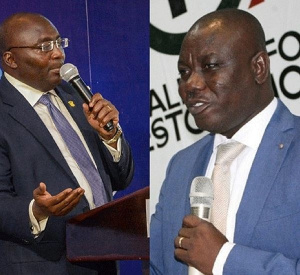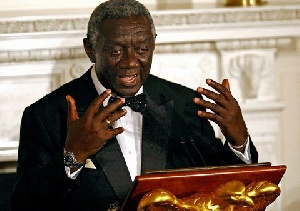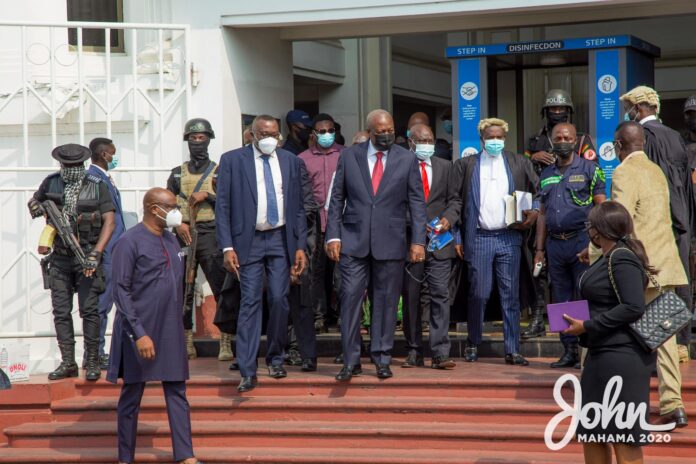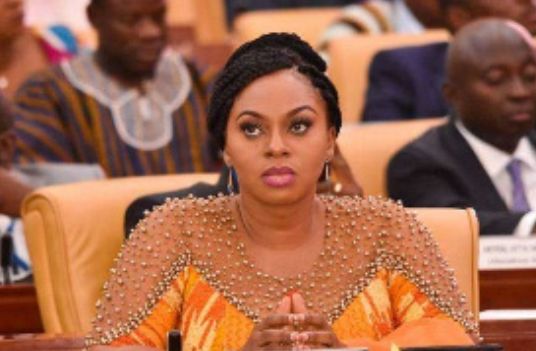Stop displaying your ignorance of economics – Adongo told

 Vice President, Dr Mahamudu Bawumia (L) and NDC MP for Bolga Central, Isaac Adongo
Vice President, Dr Mahamudu Bawumia (L) and NDC MP for Bolga Central, Isaac Adongo
NDC Member of Parliament for Bolga Central, Isaac Adongo, has been advised to stop displaying his “ignorance” of economics in his desire to respond to Vice President Dr Mahamudu Bawumia.
The Vice President this week defended the Akufo-Addo government’s debt management record and its positive impact on key economic indicators by making a comparative analysis of how the immediate past NDC government failed to prudently manage the country’s debt levels, which left every economic indicator in decline.
The NDC MP came out with his own economic analysis in response to the Vice President, and his analysis has been ridiculed by a young economist Abdallah Martin, also a former TESCON President of the University of Ghana.
In a published article, Martin exposed what he describes as “empty” and “unhealthy doses of economic analysis by Adongo.
“Naivety, classical economic theories, debt trap, high fiscal risks, external vulnerabilities and extreme hardship. These are the key opening words of Hon. Adongo in reference to the speech by Dr Bawumia and his management of the economy. It is obvious that Hon. Adongo lacks a proper understanding of the meaning of these words in context,” Martin wrote.
“He averred that Dr Bawumia mismanaged the economy into debt trap, external vulnerabilities and extreme hardship. Interestingly, he never elucidated or pursued these allegations beyond the opening. It must be put on record that Ghana’s periods of debt trap were period before HIPC and between 2012-2016. A country in a debt trap when debt servicing becomes a hindrance to the repayment of principal bogging down the country in a cycle of debt. High-interest rates and lower economic growth are the features of such a situation. Are the interest rates on debt high? What has been the average growth rate of the economy under the current government and the previous NDC government, sequestering the effect of COVID-19? Extreme hardship? No better measure than inflation and unemployment and we all know the periods these were very high,” he added.
The young economist continued that Dr Bawumia’s analysis was unambiguous and consistent with economic principles and only people like Adongo. who display their lack of understanding in economics, would disagree.
“The economic analysis carried out by Dr Bawumia was clear and unambiguous. Of course, it cannot be clear to the hollow mind.”
“Not every economist understands the transmission mechanism illustrated by Dr Bawumia in his analysis of the interdependence of the economic variables. Hon. Adongo does not understand and/or appreciate the illustrated mechanism. If he had understood and appreciated what was expressed, he would not be saying that the expression was an admission of unsustainable borrowing. If he had, he would not have been naïve to call the analysis of Dr Bawumia naïve. If he had, he would not ask the dumbest of all questions “ will he use inflation and exchange rate to pay for the debt?”
“Hon. Adongo should read the relationship between public debt and inflationary pressure in a classical research with panel data by Romero and Marin (2017). I am sure he will not ask such a lame question afterwards.”
“Anyone who studied elementary economics does not need to labour to see the direct linkage between exchange rate and public debt (especially external debt which is usually foreign currency/vehicle currency-denominated). Dr Bawumia advanced the need for prudent debt level to ensure stability in the exchange rate, inflation, interest rate and economic growth.”
“In essence, to have stable inflation rate, interest rates, exchange rate and economic growth, your debt level must be at a prudent level. Put in another way, unsustainable debt level will put the other stated variable in disarray. No theory or empirical evidence can demonstrate otherwise for all these variables.”
“Hon. Adongo could not address this central argument of Dr Bawumia except to clutch unto peripheral issues.”
Below is the full article by Martin Abdallah:
RE: HON. ISAAC ADONGO TO DR. BAWUMIA
Economics is the study of human behaviour and for one not to understand the behaviour of Hon Adongo is to lack the foundation of economics. Real economics, to put basically, focuses on behaviour of human being in the context of unlimited wants and scarce resource. The economics one needs to understand Hon.
Adongo’s behaviour can be termed “Political Behavioural Economics”, defined as the erratic behaviour of a politician to coherent and cogent argument using nebulous concepts and farcical jargon to score cheap political acceptance and popularity. This political behaviour has always driven Hon. Adongo to say something in response to whatever is being said by Dr.
Bawumia. So, I am the least surprised about the so-called reply to excerpts of the speech by Dr. Mahamudu Bawumia at the Central Regional TESCON Conference. The characteristic of any reply by Adongo to brilliance (Dr Bawumia) is the dearth of knowledge.
But as a student of economics and for the fidelity to the economics discipline, it is incumbent on us to disallow the deliberate attempt by characters like Hon. Adongo to encumber the analytical space with unhealthy doses of economic analysis. Unlike his unprofessional and amateur surgery on the issues raised by Dr Bawumia, I will take all the issues raised by Adongo, fighting the temptation to respond to his lack of decorum, and expose the lack of depth and the inherent self-serving aggrandisement.
1. Naivety, classical economic theories, debt trap, high fiscal risks, external vulnerabilities and extreme hardship. These are the key opening words of Hon. Adongo in reference to the speech by Dr Bawumia and his management of the economy. It is obvious that Hon. Adongo lacks a proper understanding of the meaning of these words in context. He averred that Dr Bawumia mismanaged the economy into a debt trap, external vulnerabilities and extreme hardship. Interestingly, he never elucidated or pursued these allegations beyond the opening. It must be put on record that Ghana’s periods of debt trap were period before HIPC and between 2012-2016. A country in a debt trap when debt servicing becomes a hindrance to the repayment of principal bogging down the country in a cycle of debt. High-interest rates and lower economic growth are the features of such a situation. Are the interest rates on debt high? What has been the average growth rate of the economy under the current government and the previous NDC government, sequestering the effect of COVID-19? Extreme hardship? No better measure than inflation and unemployment and we all know the periods these were very high.
2. Ill-fated Deficient technical analysis of exchange rate development? It is surreal that after 3 years of the debate on exchange rate analytical brouhaha, Hon Adongo has not picked up any new lessons aside the archaic and rigid conceptual framework of exchange rate depreciation. The likes of Dr. Nii Moi Thompson and Dr. Ato Forson jumped into the debate without success. I am not sure this is the time it will be won by Hon. Adongo. Maybe this time around, Honourable will learn in repetition. David Henderson who probably was the first to hold the views now held by Hon. Adongo and his cohorts would have probably changed his position after the facts. Hon. Adongo should go and read about Purchasing Power Parity (PPP). If inflation differential between two countries can double (100%) and PPP can hold, which is does hold, then depreciation can be 100%.
3. Interdependence of economic variables. The economic analysis carried out by Dr. Bawumia was clear and unambiguous. Of course, it cannot be clear to the hollow mind. Not every economist understands the transmission mechanism illustrated by Dr. Bawumia in his analysis of the interdependence of the economic variables. Hon. Adongo does not understand and/or appreciate the illustrated mechanism. If he had understood and appreciated what was expressed, he would not be saying that the expression was an admission of unsustainable borrowing. If he had, he would not have been naïve to call the analysis of Dr. Bawumia naïve. If he had, he would not ask the dumbest of all questions “ will he use inflation and exchange rate to pay for the debt?” Hon. Adongo should read the relationship between public debt and inflationary pressure in a classical research with panel data by Romero and Marin (2017). I am sure he will not ask such a lame question afterwards. Anyone who studied elementary economics does not need to labour to see the direct linkage between exchange rate and public debt (especially external debt which is usually foreign currency/vehicle currency denominated). Dr. Bawumia advanced the need for prudent debt level to ensure stability in exchange rate, inflation, interest rate and economic growth. In essence, to have stable inflation rate, interest rates, exchange rate and economic growth, your debt level must be at prudent level. Put in another way, unsustainable debt level will put the other stated variable in disarray. No theory or empirical evidence can demonstrate otherwise for all these variables. Hon. Adongo could not address this central argument of Dr Bawumia except to clutch unto peripheral issues.
4. Discounting the relevance of the interdependence of major economic variables. Hon Adongo without a cogent argument to discredit the transmission and interaction of the major economic variables with the public debt level resorted to the argument that these variables are not relevant in explaining unsustainable debt levels. Really? Why do we then have to worry about sustainable debt levels if it were not concerned about economic growth? What are the relevant variables then? Guess what! Hon. Adongo could not provide any. Rather, he resorted to the 2021 budget (a period government was concerned about fighting the pandemic) to create a dishonest picture of the government using 91% of tax revenue to finance public debt. This speaks to the honesty of Hon. Adongo with which he accused Dr Bawumia of dishonesty.
5. Dishonesty in alleging dishonesty. In a substantial part of what is supposed to be response to the current statement of the Vice President on the management the economy, Mr. Adongo, focused on questioning the credibility and honesty of Dr. Bawumia. He commented on the limited fiscal space and current debt levels without factoring in COVID-19 but in subsequent argument, he factored in the pandemic to wither away the competence in managing the currency. Incredulous! Aside from this marked dishonesty in alleging dishonesty, to dedicate a page to his usual theatrics and lousy comments about “Mallam-Atta Market Inflation” and Hajia Samira buying tomatoes and onions for Okro Soup speaks to the ineptitude of a person supposed to be representing the good people of Bolgantaga Central. Heavens know that Ghanaians cannot take a sermon on credibility and honesty from Mr Adongo.
6. “Dr Bawumia attributed exchange rate movements to the fundamentals of the economy without due consideration for exogenous shocks”. Did he make such a statement? The lawyers will say, you can’t approbate and reprobate! You fault Dr Bawumia for exchange rate depreciation but you attribute any gains of the currency to a benevolent spirit external to the system. Did I read from him that the Cedi was doing well because of reduced importation occasioned by COVID-19? For the records, the Cedi ended the first quarter of this year as the best performing currency in Africa, outperforming 15 currencies. For the records, the gain of the cedi profited from growth-related interventions such as diversified exports of cocoa and gold and the Forex forward market initiatives of the Central Bank. None of this is exogenous. The widespread of COVID-19 cases across the globe will zero-out or sedate its effect on foreign exchange. It would have been honourable for Mr Adongo to live his name and tell his readers the exogenous factors.
7. Ghana’s debt burden. Neither the government nor Dr Bawumia is denying that the debt stock of the country has increased significantly over the past year on the back of COVID-19. Revenue shortfall and COVID-induced expenditure for the containment of the virus mainly explained the situation.
The admission by the Vice President was a sign of respect and fidelity to the facts. Dr Bawumia will never hide and has never hidden from economic data and facts. But the appetite for low-interest debt instruments of the Republic is a vote of confidence in the management of the economy.
To have a Eurobond oversubscribed under this current global debt financing architecture is a sign that the investors have faith in the prospects of the borrower to repay. For who lends money to an unworthy borrower?
As stated at the beginning, I understand why Mr Adongo will want to respond to Dr Bawumia even when the response is empty. But it will be worthwhile for Mr Adongo to be a merchant of pork than to venture into the hawking of economic concepts for fame.
Abdallah Matin
[Former TESCON President, UG]




